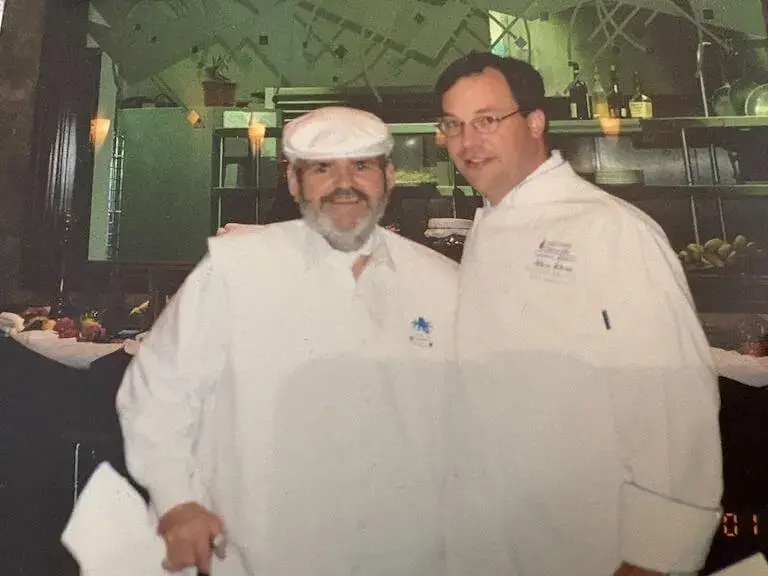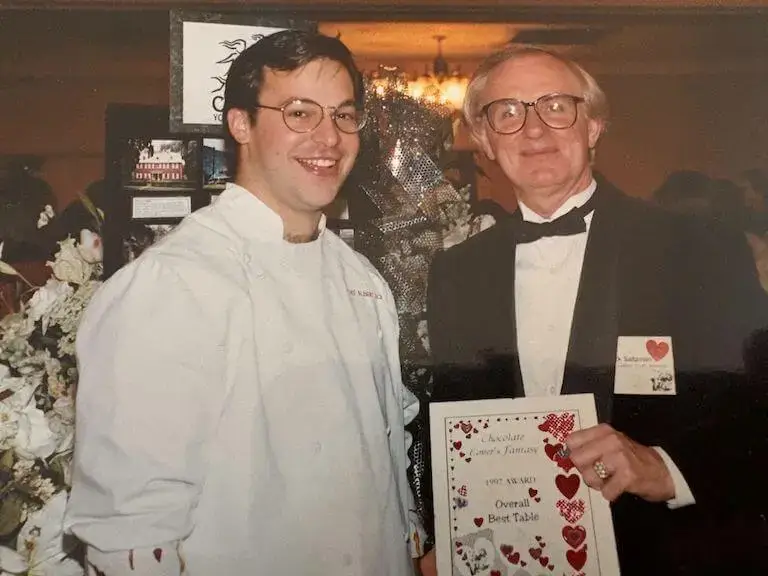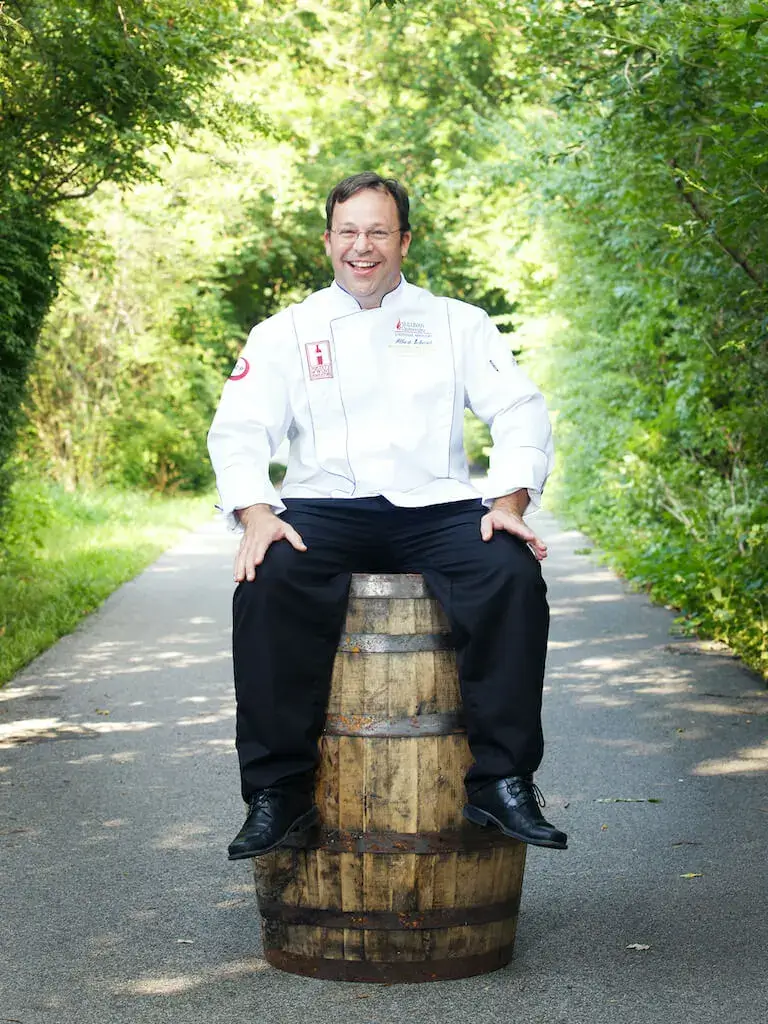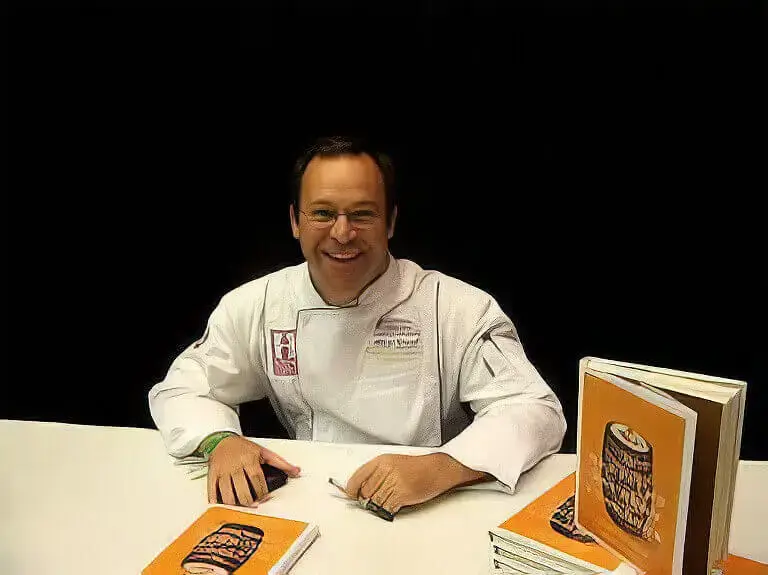Listen to This Article:
Imagine attending an elementary school in New Orleans where field trips walking down Bourbon Street and exploring the French Quarter are regular occurrences. You’re surrounded by not only the history and stories of the city but also the sights and smells of some of the most iconic restaurants in the country.
It was on a field trip just like this that a young Albert Schmid watched busy chefs meticulously preparing breakfast at Brennan’s Restaurant, a New Orleans institution, and realized people could make money preparing and serving food to others.
It was a moment that began to set the stage for a culinary career rooted in passion, purpose, and storytelling.
But Chef Albert’s path didn’t follow a traditional trajectory. While initially pursuing writing, he discovered a love for the culinary world. After recognizing the challenges of balancing long hours in the kitchen with being a present father, he rewrote his story to craft a career blending professional success with personal fulfillment.
Today, as an Escoffier Chef Instructor, an award-winning author, and a storyteller at heart, Chef Albert inspires others to take risks, preserve culinary traditions, and design careers that support the lives they want.
How It All Started: A Taste for Food and Stories
Although New Orleans helped shape Albert’s culinary perspective, his first memory of food dates back to his time in Texas, where he was born. When his father was in seminary school, he would take young Albert to the library with him when he needed to study.
“I would crawl under the desk, and he would feed me peppermint Life Savers under the table to keep me quiet,” Albert recalls. “And so that’s my first memory of food, and I love mint even today.” This first fond food memory provides a perfect example of how two elements—books and food—have woven themselves together in Albert’s life.
When Albert’s father finished seminary school, the family relocated to Louisiana, where Albert had his first taste of dirty rice. It’s a popular dish consisting of fried rice and chicken livers, and Albert loved it.
The French Quarter was full of culinary creativity and inspiration. Albert’s elementary school participated in Montessori, or hands-on, learning. So, the classes took frequent field trips walking to the French Quarter where students were immersed in an environment of street performances, bustling vendors, lively music, and smells of everything from sweet beignets to spicy gumbo.
Albert remembers when Paul Prudhomme, known for popularizing cajun and creole cooking, left Commander’s Palace to start his own restaurant called K-Paul’s almost right next to Brennan’s. It was small, with only 15 tables. K-Paul’s didn’t take reservations but there was always a line out the door and people would wait two to three hours for a table.

Chef Albert meeting Paul Prudhomme, who had become a national figure in New Orleans’ culinary scene.
“I thought it was the strangest thing,” Albert says. “Why would you wait two or three hours? You’re in New Orleans. You’ve got Brennan’s. You’ve got Arnaud’s, Antoine’s. You’ve got Commander’s Palace, and yet you’re going to wait three hours to go to K-Paul’s. And it wasn’t until much later, when I dined there, that I got it. And he of course blew up into a national figure.”
A First Book Signing Event
At home, Albert was picking up a love for storytelling. His father would entertain the family with stories of his time in the Coast Guard, always telling the stories the same way to the point that Albert smiles as he recalls them to this day.
Albert’s interest in storytelling was further inspired by an assignment from his elementary teacher, Jenny Langham. Albert and his classmates had to write their own stories. But Ms. Langham took it a step further and had their stories each bound into its own book. She had a way of making every child feel special and encouraged them to try new things.
As a way to show her students they were worthy of good opportunities, Ms. Langham hosted a book signing event in class where students could sign their books for each other. While this may seem like nothing more than a childhood school assignment, it was a moment that stuck with Albert and helped him when an opportunity presented itself for him to write his own book as an adult.
Rising to the Occasion
When Albert was in high school, his dad moved the family back to Texas, where Albert was exposed to more types of cuisine—Tex-Mex, Mexican, and Texas barbecue. He enjoyed all the new flavors of the regional cuisine, but a culinary career wasn’t yet on his radar. Instead, Albert’s aspiration was to finish high school and become a journalist.
To start making money in high school, Albert got a job working at a Rocky Mountain Chocolate Factory. He gained experience in confections but wasn’t planning to use that experience in the future. However, while in college, Albert ended up unexpectedly moving out of state with his family and having to take time away from school. He tried to get a job at a department store chocolate shop only to be told there were no openings, though they were looking for help in the bakery. Albert didn’t have experience, but was he going to let that stop him?
He thought back to a story his father told about tackling a daunting dissertation and deciding if someone else could do it, so could he. With that same determination, Albert took the job at the bakery and began making cookies and cinnamon rolls.

These entry-level jobs were just the beginning of Chef Albert’s career.
Over the next few years, Albert bounced back and forth from school to work. Although his interest had shifted from journalist to writer, he couldn’t help but notice that the culinary jobs seemed to be working out. He talked to the chef of a five-star hotel about potentially becoming a pastry chef—and the chef, who was in the process of starting a restaurant, offered Albert the job. Albert began to realize the value of his baking and pastry experience, along with the doors it could open in the culinary industry.
An Unconventional Culinary Career Shift
While Albert was thriving in his culinary career, he began to notice the cost of the demanding schedule and long hours in a professional kitchen: time away from his family. He realized how much he was missing in his son’s life and knew something had to change.
Albert made what some in the culinary industry might consider an unconventional move.
“I went from working in restaurants and country clubs,” he says, “to doing university food service so I could spend more time with the kids.”
The hours were better for the life that he wanted as a father, and he could complete his studies for a Bachelor of Science degree (he would later earn a Master of Arts in Gastronomy). In addition, the pivot to working in university food service ended up opening new doors in his culinary career. He became the executive chef at a university, overseeing 11 campus restaurants, a scratch bakery, and catering operations—including meals for the football team, the convention center, and high-profile events at the University President’s house, where he cooked for dignitaries, government officials, and Olympic athletes.
Although Albert enjoyed the job, his career took another unexpected turn a few years later. While helping a baker friend explore teaching opportunities, Albert discovered an opening at Sullivan University in Louisville, Kentucky. While his friend wasn’t qualified for the position, he encouraged Albert to pursue the role. He applied, was hired, and moved his family to Kentucky.

Albert Schmid’s move to Louisville, Kentucky, marked a turning point in his career, allowing him to balance his passion for food with a fulfilling role as an educator.
The position offered the work-life balance he had been seeking, even allowing him to drop off and pick up his sons from school. It also gave him a new way to share his culinary knowledge through teaching others.
“I really enjoyed doing the job,” Chef Albert shares, “one of the best things to see is a student finish up your classes, graduate, and then go on and succeed in their career.”
Redefining Success in the Culinary Industry
By stepping away from the demanding hours of professional kitchens, Albert crafted a career that allowed him to excel professionally and be present for his family. And he wants future culinarians to know: “There’s always an avenue.”
One of the problems that Albert found with culinary schools in the past was that they only trained people to work in fine dining, which limited career options for students.
“But that’s not really what we’re doing anymore,” Chef Albert says. “Culinary students can be writers, TV personalities. They can work in a kitchen, but they don’t necessarily have to work in a restaurant kitchen or a country club. Or they can do university food service. They can do hospitals, which are really big.”
From food trucks to teaching private cooking workshops, Chef Albert points out that culinary students now have the opportunity to define what they want their culinary career to look like. Just as he found a way to balance his passion for the culinary world with his family, each culinary student has the opportunity to write their own story and define what success looks like for them.
While working in Kentucky, Albert continued to recognize and embrace unexpected opportunities. His ability to act boldly and think creatively opened doors he never anticipated, including one that led him to become a published author.
The Culinary World Meets Storytelling in Albert’s Career
Shortly after starting at Sullivan, Albert was filling in answering phones when a publisher called looking for one of the chef instructors who they had a book contract with. A lightbulb went off. Albert answered the question for the caller and then asked, “How do I get a book deal?”
The person was incredibly helpful and explained the process. After the call, Albert got to work. He had been teaching a class from a textbook called Grossman’s Guide to Wine, Spirits and Beers, but he knew students weren’t reading the book. Albert thought the information could be condensed down into what the students really needed to know. By the end of the week, he submitted a book proposal for what would become his first published book, The Hospitality Manager’s Guide to Wines, Beers and Spirits.

Albert Schmid’s bold question—“How do I get a book deal?”—launched a writing career that led to award-winning cookbooks and celebrated culinary storytelling.
The book launched his writing career and allowed him to combine his culinary expertise with his love of writing and, eventually, storytelling. His textbook was just the beginning. Albert went on to write multiple cookbooks, winning three Gourmand Awards, including the prestigious international Gourmand World Cookbook Award for The Kentucky Bourbon Cookbook.
While it was one of the things he’s most proud of in his career, Albert doesn’t take credit for the book himself. He shares there was a team of people behind it from editors to other chefs and food stylists. “It was a team of people that put that book together,” Chef Albert says. “I just happened to be the author.”
Preserving Culinary Heritage Through Storytelling
Albert’s cookbooks aren’t just about the recipes, though. They are a form of storytelling and a way to protect authentic regional cuisine. As he moved from textbooks to more coffee table books, writing that he found more enjoyable, his work began to focus more on helping preserve regional culinary traditions.
His cookbooks, including Burgoo, Barbecue, and Bourbon, document and celebrate dishes that are deeply tied to culture and history but risk fading from memory. “The regional cuisines are just incredible here in the United States,” Albert shares. “They resonate with people because it is something special, and it’s something which I also think is being lost a little bit.”

Burgoo, a beloved but lesser-known Kentucky dish, is one of the many regional recipes Albert Schmid works to preserve through his cookbooks and storytelling.
The book was meant to be about burgoo, a dish often unknown outside of Kentucky, but the idea expanded when he was asked to review a collection of 2,400 rare regional cookbooks at Western Kentucky University.
“I was also seeing things that I had not seen before,” he says, “even though I had lived in Kentucky for ten years.”
The dishes weren’t being served anywhere, and Albert wanted to help preserve them.
His passion for preserving authentic regional cuisine goes beyond Kentucky. Albert shares how this is happening all around, including in New Orleans. As restaurants recruit people from outside of their area, new chefs are putting their own twists on regional dishes and throwing in new ingredients, which ends up taking away from the original cuisine. He wants to help ensure we don’t lose what makes each regional cuisine special, and one way he’s able to do this is through writing and teaching. Albert continues to use storytelling to help connect people to food.
Life Lessons and Legacy
Albert’s career reflects a belief that life is a story waiting to be written—and rewritten. Throughout his journey, he has embraced opportunities to explore new paths, from baking and teaching to writing award-winning cookbooks. His ability to pivot and adapt has not only shaped his own career but also inspired others to pursue their passions on their own terms.
He views watching his students succeed as one of the best accomplishments of his culinary career. He takes pride in seeing how his students apply what they’ve learned in the world as they write their own culinary stories. Some have gone on to have their own cookbooks published or be nominated for James Beard Awards. Others have worked in hospital kitchens, where a carefully prepared meal becomes a source of comfort and healing.
Chef Albert wants students to find their own path, just as he did. “Just because you end up in a particular place doesn’t mean that you are stuck in that particular place,” he encourages. “Just because you’re doing a particular thing doesn’t mean that you can’t branch out and do other things. You should never, ever have somebody tell you what your life is going to be. You can make those adjustments to your life as you need to and as you want to.”
Through his teaching, writing, and example, Albert continues to inspire others to view their careers as stories they can shape to fit their goals and values.
Writing Your Own Culinary Story
From those early field trips in New Orleans to working in kitchens, teaching students, and writing cookbooks, Chef Albert has built a career that brings together his love of food, storytelling, and purpose. More importantly, he’s done it on his own terms. He created a path that allowed him to grow professionally while still being present for his family.
Albert’s story is a reminder that there’s no one-size-fits-all path in the culinary world. Whether your heart is in a busy kitchen, on the page, or in the classroom, the skills you gain in culinary school can help lay the foundation for a career that fits your life.
If you’ve been inspired by his story and are ready to explore your own path, culinary school could be your first step. At Auguste Escoffier School of Culinary Arts, you can learn the skills and techniques to pursue your passion while discovering how to create a career that fits your life.
Start writing your culinary story today. Contact us to explore Escoffier’s programs and take the first step toward your future in food.

